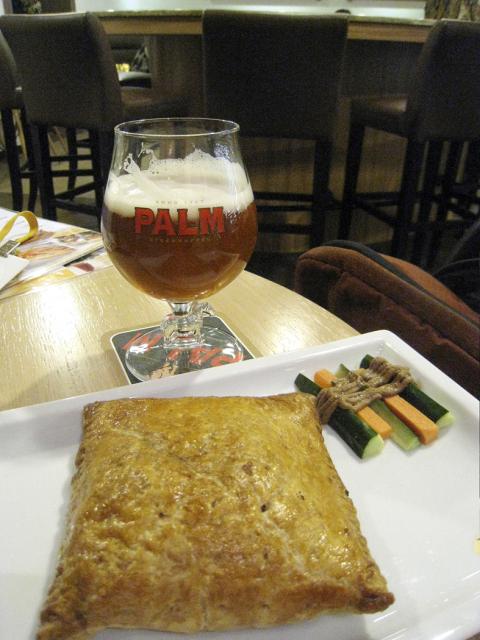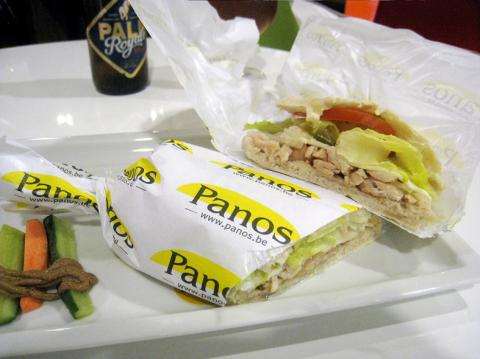Some places want to be all things to all people. Panos Cafe Taiwan tries hard, and despite many appealing qualities, does not come together as a coherent whole. It wants to be a healthy eating option, a cafe, a bakery, a European-style diner, a bar, a breakfast joint, and a gathering place. You see hints of all these things, but it does not manage to excel in any particular area.
Panos is a Belgian brand that has some similarities to the American Subway sandwich chain: Fast food with a veneer of healthy eating. Panos has a range of baked goods, ranging from breads to pasties to waffles. Never having tried the original Belgian product, it is hard to compare the Taiwan outlet to the original, but it doesn’t take much to realize that there has been a high degree of localization. For those who hoped to see another competitor in the European-style baked goods segment, Panos cannot but be a disappointment. Worse yet, its localized items do not seem to have caught the imagination of locals, and might well be off-putting to those looking for conventional western diner food.
The first thing I tried when I first visited Panos was the Belgian waffles. You would not think you could go far wrong with waffles at such an establishment, but looking at the menu immediately sparks a sense of trepidation. There are some very “interesting” choices, and deciding that half-measures would not do, I opted for the waffles with cream cheese, guava, tomato and plum sauce (NT$150). It was not as weird as it might have been, but neither did it open up new horizons. The slightly acid flavor of the guava was actually rather nice with the waffles, which were crisp, but the tomato and plum sauce were something of an afterthought, as indeed was the cream cheese. The plate failed to look either elegant or inviting, and did not provide much incentive to try out the waffles with green mango, coffee cream or tuna.

Photo: Ian Bartholomew, Taipei Times
The pasties were equally interesting in all the wrong ways, but the waffles had blunted my curiosity for weird taste sensations and I played it safe with a pasty stuffed with braised pork rice (滷肉飯), mushrooms and cheese (NT$180), which seemed preferable to the other savory options, one of which included pork floss. The pasty arrived, a square pocket of puff pastry on a large white plate, along with two tiny sticks of carrot and three of cucumber with a thick tahini-esque dressing piped on top. This was minimalism unhinged, and the flavors did very little to balance out the inadequacies of design. The pasty was well filled and had a perfectly satisfactory meaty texture, but it was not something to savor. That said, it was a good filler to accompany the small selection of Belgian beers available. The sandwiches have the most conventional appearance on paper, and also prove the most satisfactory. The Mexican spicy smoked chicken sandwich (NT$150), served in a bread described as Panizza, a kind of mix of pizza and Panini, had a good hit of spice, with tomato and onion, giving it some moisture. The bread itself was a bit like cardboard, but definitely a superior brand of cardboard.
One of the main selling points, and the feature that gives Panos a European vibe, is its selection of beers, some on tap, others bottled, from the Palm brewery. Palm’s regular is available, along with Rodenbach, Steenbrugge Wit Beer and Estaminet, all on tap, for NT$130, and there is a larger selection of bottled beers (NT$150 to NT$220). The staff is woefully ignorant about the beers, and while the price is very reasonable, availability is erratic.
Pasta, salads, soups and pocket sandwiches are all available, all with the same “local” twist, but with not much real local flavor. The coffee is mediocre.

Photo: Ian Bartholomew, Taipei Times
As for the decor, the designers seem to have gone out of their way to make the seating uncomfortable and the ambiance rather cold, and while Panos offers good Wi-fi, it does not offer power sockets. The use of an electronic card for ordering is a great way of running up a tab if one wanted to segue from lunch to afternoon drinks, or from a coffee to cakes (a small selection that have a rather too “homemade” appearance to display well under glass), but its just a pity that the products available and the ambiance are just not interesting enough to justify the card’s extensive use.

June 2 to June 8 Taiwan’s woodcutters believe that if they see even one speck of red in their cooked rice, no matter how small, an accident is going to happen. Peng Chin-tian (彭錦田) swears that this has proven to be true at every stop during his decades-long career in the logging industry. Along with mining, timber harvesting was once considered the most dangerous profession in Taiwan. Not only were mishaps common during all stages of processing, it was difficult to transport the injured to get medical treatment. Many died during the arduous journey. Peng recounts some of his accidents in

“Why does Taiwan identity decline?”a group of researchers lead by University of Nevada political scientist Austin Wang (王宏恩) asked in a recent paper. After all, it is not difficult to explain the rise in Taiwanese identity after the early 1990s. But no model predicted its decline during the 2016-2018 period, they say. After testing various alternative explanations, Wang et al argue that the fall-off in Taiwanese identity during that period is related to voter hedging based on the performance of the Democratic Progressive Party (DPP). Since the DPP is perceived as the guardian of Taiwan identity, when it performs well,

The Taiwan People’s Party (TPP) on May 18 held a rally in Taichung to mark the anniversary of President William Lai’s (賴清德) inauguration on May 20. The title of the rally could be loosely translated to “May 18 recall fraudulent goods” (518退貨ㄌㄨㄚˋ!). Unlike in English, where the terms are the same, “recall” (退貨) in this context refers to product recalls due to damaged, defective or fraudulent merchandise, not the political recalls (罷免) currently dominating the headlines. I attended the rally to determine if the impression was correct that the TPP under party Chairman Huang Kuo-Chang (黃國昌) had little of a

At Computex 2025, Nvidia CEO Jensen Huang (黃仁勳) urged the government to subsidize AI. “All schools in Taiwan must integrate AI into their curricula,” he declared. A few months earlier, he said, “If I were a student today, I’d immediately start using tools like ChatGPT, Gemini Pro and Grok to learn, write and accelerate my thinking.” Huang sees the AI-bullet train leaving the station. And as one of its drivers, he’s worried about youth not getting on board — bad for their careers, and bad for his workforce. As a semiconductor supply-chain powerhouse and AI hub wannabe, Taiwan is seeing